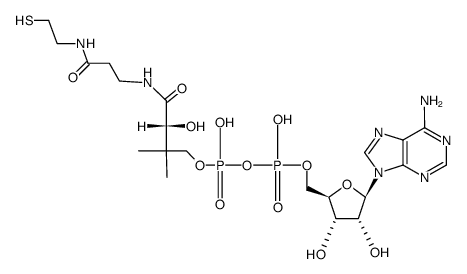Hepatic CoA, S-acyl-CoA, biosynthetic precursors of the coenzyme and pantothenate-protein complexes in dietary pantothenic acid deficiency.
A G Moiseenok, V M Sheibak, V A Gurinovich
文献索引:Int. J. Vitam. Nutr. Res. 57(1) , 71-7, (1987)
全文:HTML全文
摘要
Weanling rats were fed a pantothenic acid (PA)-free diet for 11 days. Although the animals did not show symptoms of vitamin deficiency, the concentrations of total and free CoA (analyzed with 2-oxoglutarate dehydrogenase), the levels of CoA, dephospho-CoA and 4'-phosphopantetheine (assayed together in the N-acetylation reaction) were decreased. As PA deficiency developed (by days 33-44 of the experiment), the reduction of the content of these metabolites and short-chain acyl-CoA became more pronounced. The level of long-chain acyl-CoA, the ratios of free CoA/total CoA and long-chain acyl-CoA/total CoA remained unchanged. The coenzyme biosynthetic precursors demonstrated the most marked response to the severity of PA deficiency. The relative stability of the hepatocyte CoA pool is interpreted in terms of the cytosol ability to deposit the vitamin in the form of pantothenate-protein complexes.
相关化合物
| 结构式 | 名称/CAS号 | 分子式 | 全部文献 |
|---|---|---|---|
 |
3'-去磷酸辅酶 A
CAS:3633-59-8 |
C21H35N7O13P2S |
|
Simultaneous high-performance liquid chromatography determin...
2012-11-15 [Anal. Biochem. 430(2) , 151-5, (2012)] |
|
Identification of the active site of phosphoribosyl-dephosph...
2000-10-31 [Biochemistry 39(43) , 13233-40, (2000)] |
|
Purification and characterization of phosphopantetheine aden...
1999-09-17 [J. Biol. Chem. 274(38) , 27105-11, (1999)] |
|
Hydrolysis and absorption of pantothenate and its coenzymes ...
1983-10-01 [J. Nutr. 113(10) , 2107-15, (1983)] |
|
Coenzyme A affects firefly luciferase luminescence because i...
2005-10-01 [FEBS J. 272(20) , 5206-16, (2005)] |